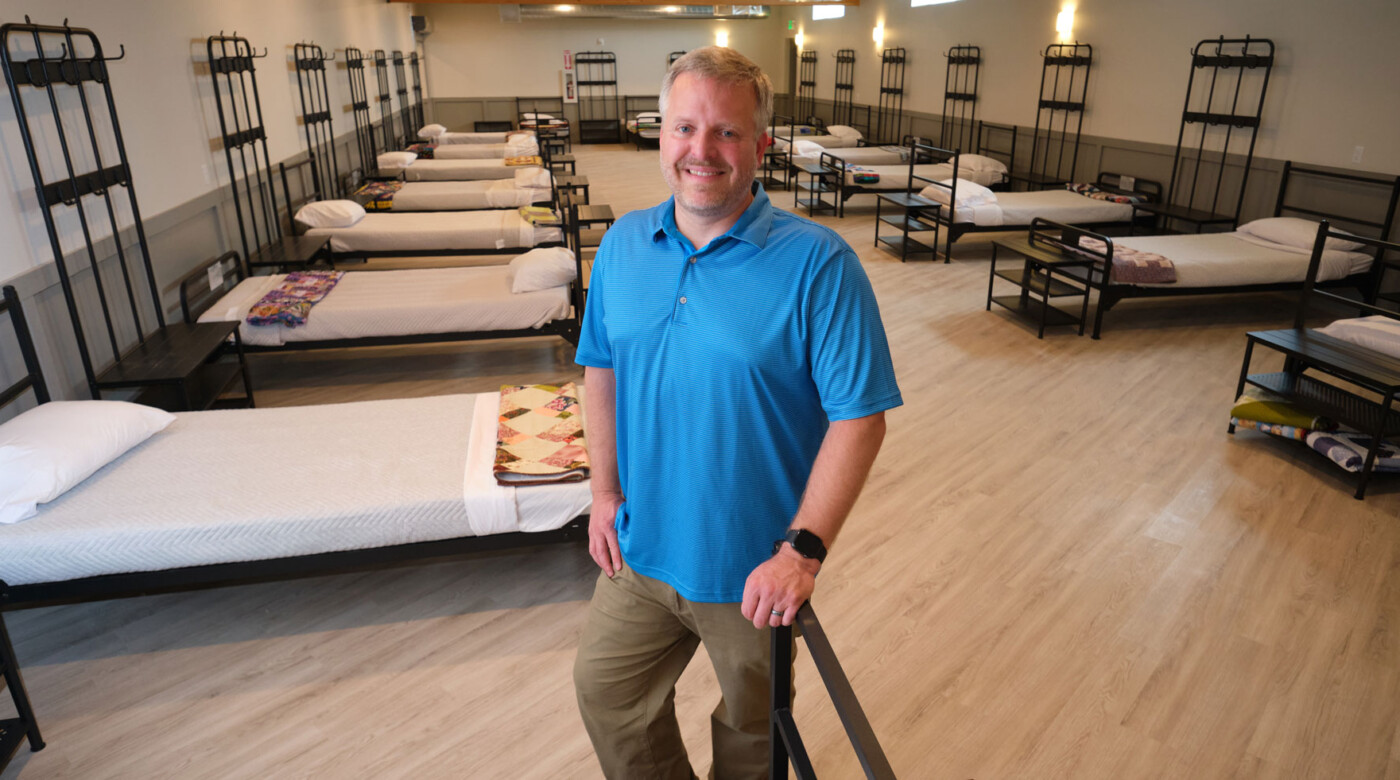Tacoma Rescue Mission Executive Director and PLU alumnus Duke Paulson on adapting through the pandemic

By Lora Shinn
Marketing & Communications Guest Writer
Duke Paulson ‘93 graduated from PLU in 1993 with a major in biology and a minor in psychology. While at PLU, he was on the swim and rowing teams, played soccer for a bit, and was heavily involved in Young Life. Today, he's executive director of Tacoma Rescue Mission where COVID-19 has added to the already urgent work of sheltering and supporting individuals experiencing homelessness in Tacoma.
How long have you been with Tacoma Rescue Mission and what drew you here?
I’ve been with Tacoma Rescue for two years. In college, I volunteered here, doing some Street Under the Bridge Ministry with Ron Vignec, a former campus pastor.
The rescue mission was on my radar as a place that impacts the community, on my shortlist of workplaces for more than a decade. So this was kind of a dream job for me. We have several Lutes that work for the rescue mission.
After graduation, I was offered a job by a nonprofit, Metropolitan Development Council, where I worked for almost 18 years. Then I was Executive Director at Helping Hand House, a small Puyallup shelter for homeless families. After that, I worked at the MultiCare Foundation and came to the rescue mission in 2018.
During the initial spring COVID-19 outbreak, how did the partnership with Bellarmine Prep come about?
I called everyone I knew and posted on Facebook, looking for a large facility space that we could use as a shelter. I got about 25 leads, but it was an old PLU friend who actually gave me the phone number of Bellarmine’s president.
Bellarmine (a well-known Catholic high school in Tacoma) was interested. They talked to their board, and got back to me within 48 hours. The board took four days to get an MOU together, starting on Thursday. By Monday, we had things set up and going. So they were responsive and a great partner with us. We have between 55 and 60 men that are sleeping there every night, right now.
What have you learned during the pandemic?
It’s been an enormous opportunity to learn and grow. It’s been a huge leadership opportunity to communicate with everyone who is scared: guests coming here, volunteers, and the greater community. We had to communicate well with newspapers and TV stations about our COVID-positive person that was identified and stayed at the mission. It hit the front page of the paper.
I learned how to develop your points, find the right tone, and lead through a crisis from some excellent communication teachers.
I’ve also been blessed by the community. We lost all these volunteers, yet the number of people coming for meals went from 850 a day to 1200 or 1300 people a day. We’ve had hundreds of people bringing thousands of sack lunches at home, bringing, so that’s been blessing. The community has rallied around, and the support has been neat.
How has leadership played a role in your response?
It helps to have the right team, whether the people around you or in the community. I have long-term relationships and friendships where supportive people said, “Hey, I know this is hard. How can we help you?”
It’s helpful, to be honest, and vulnerable and able to say that times like these are scary. We had a first positive case, and another one soon after. Some people were advising my wife and kids to have me sleep somewhere else.
But his is what we’re called to do. For Tacoma Rescue Mission, our mission is to serve people, and we’re going to keep coming in and keep working. If we shut down, people have no place to go. This is their home. It’s a unique challenge to be in.
Any advice or encouragement you might share with PLU students graduating this spring hoping to enter human services or the nonprofit world?
It’s a weird time, for those graduating or trying to get established in a career when everything’s upside down. But there’s still a huge need for good people.
When I hire someone, I’m not hiring them based on how they answer the questions, I’m hiring based on where their heart is.
If they seem to communicate: “Yes, I want to help, will pour myself into this, and be fully engaged in work with the guests and the clients I’m going to see, but also be a good partner and a good teammate, and use my skills to problem solve and work together collaboratively.” I’ll find a place for that person somewhere in the organization.
Getting your foot in the door can be hard, absolutely, but volunteering and finding ways to demonstrate that attitude will still get you hired. I see this in everyone from friends operating grocery stores to what I’m doing right now in the nonprofit world. People are trying to find really good people.


